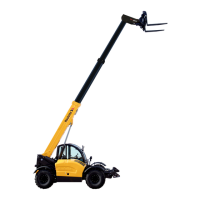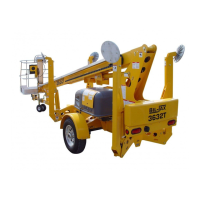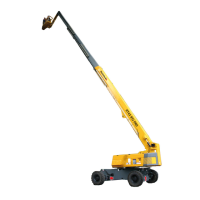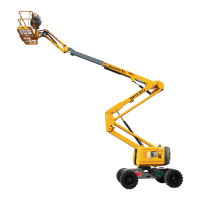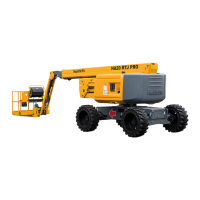What to do if Haulotte Boom Lifts display F04.06 (D) Boom telescoping PWM solenoid valve fault?
- CchristophergilbertAug 30, 2025
If you're experiencing an F04.06 (D) error related to the boom telescoping PWM solenoid valve, check YV340 or YV360.

What to do if Haulotte Boom Lifts display F04.06 (D) Boom telescoping PWM solenoid valve fault?
If you're experiencing an F04.06 (D) error related to the boom telescoping PWM solenoid valve, check YV340 or YV360.
What to do if Haulotte HTL 7732 Boom Lifts show F02.03(D) Main contactor fault?
If you are experiencing an F02.03(D) error related to the main contactor fault, check KMG.
What to do if Haulotte Boom Lifts show F04.05 (D) Boom lifting PWM solenoid valve fault?
If you're getting an F04.05 (D) error for the boom lifting PWM solenoid valve, check YV300 or YV320.
What to do if Haulotte Boom Lifts display F03: Relay error?
If your Haulotte Boom Lifts are displaying an F03 error, indicating a relay issue, check KA160.
What to do if Haulotte Boom Lifts show F02: Contactor error?
If you encounter an F02 error related to the contactor, check KM120.
What to do if my Haulotte Boom Lifts show F04: Solenoid valves error?
If you are experiencing an F04 error related to solenoid valves, check YV400 or YV420.
What to do if Haulotte Boom Lifts show F04.32 (D) Hydraulic unlocking TOR solenoid valve fault?
| Platform Height | 6.55 m |
|---|---|
| Weight | 2, 200 kg |
| Turning Radius | 2.50 m |
| Power Source | Electric |
| Maximum Lift Height | 7.32 m |
| Maximum Forward Reach | 4.50 m |
| Platform Capacity - Restricted | 200 kg |
| Drive Speed - Stowed | 4.5 km/h |
| Working Height | 7.32 m |
| Horizontal Reach | 4.50 m |
| Drive Speed | 4.5 km/h |
Guidance on using the operator's manual, understanding symbols, labels, and colors.
Guidelines, prohibitions, and potential risks for safe machine operation.
Operator's duties for safe and correct machine operation, including reporting faults.
Overview of inspection and maintenance responsibilities for machine upkeep.
Pre-operation checks and functional tests before using the machine.
Detailed walk-around inspection and checks before operation.
Information on safety stickers, their meanings, and color codes.
Overview of the operator's cab, controls, seat, and environment systems.
Description and operation of the radio-control emitter and its safety devices.
Procedures for starting, operating, and shutting down the engine.
Safety rules and procedures for lifting, transporting, and placing loads.
Procedures for preparing and operating the machine on the road.
Steps for loading and securing the machine for transport.
Criteria for approved attachments and risks of using unapproved ones.
Information on capacities for telehandlers, attachments, and forks.
How to properly use the capacity chart with forks for safe operation.
Procedures for installing mechanical and hydraulic attachments.
Instructions for adjusting and moving forks on the machine.
Detailed technical data for various attachments like forks, buckets, and jibs.
General operation procedures for attachments, including controls and charts.
Procedures and precautions for towing a disabled machine.
Procedure for manual boom lowering in emergency mode.
How to safely exit the cab in an emergency situation.
Testing and checking the Load Moment Indicator (LMI) system.
Common faults, their causes, and solutions.
